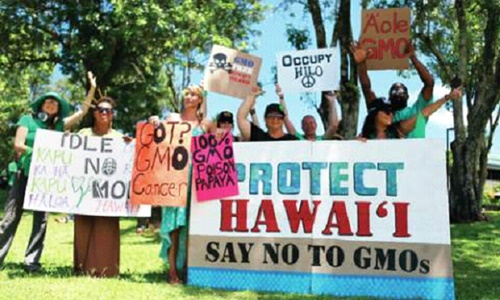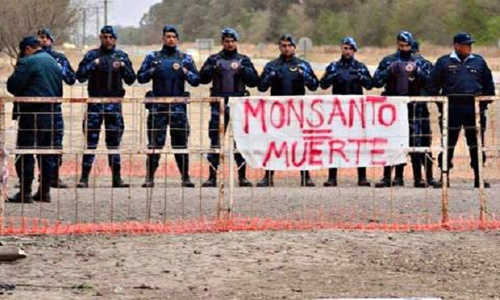


From Nation of Change:
What stands in the way of SB2736 is the Agriculture Committee, where it was referred, circumnavigating committees in charge of finances and consumer protection.

This time next year all of Hawaii could have a GMO food labeling bill that requires Monsanto, Syngenta, and other Biotech and Agriculture companies to label their frankenfoods. Senate Bill 2736 has been emotionally debated in a community hearing held earlier this week, and if enthusiastic ‘No to GMO’ advocates get their way, then all genetically modified foods will be labeled as such by January 1, 2015. The discussion on this topic was kept until the very end of a community forum, with many people who had shown up to support the bill having to leave prior to its discussion being taken up.
What stands in the way of SB2736 is the Agriculture Committee, where it was referred, circumnavigating committees in charge of finances and consumer protection. Senator Rosalyn Baker is concerned that it won’t get past the Agriculture Committee since the Chairman of this committee is Clarence Nishihara, who has been opposed to labeling GMOs. Baker lamented, “It’s doubtful, I think, with that line-up that the bill would get another hearing, but one never knows.”
SB2736 is just one of many GMO-bills the Agricultural Committee is reviewing this year. Other bills under review would require more biotech disclosure and still others would ban GMO in Hawaii altogether.
You can contact Clarence Nishihara, and let him know just what you think of GMO, as well as Ronald D. Kouchi, the Vice-chair of the committee about to review this important GMO legislation. If you’ve ever visited Hawaii, or dreamed of visiting, you have a right to demand non-genetically modified foods for now and future generations.
Other bills related to GMOs that were introduced in the Senate include Senate Bill 2955 and Senate Bill 2737, both of which would require more disclosure from biotech companies.
“Given that we don’t have a referendum/initiative process in Hawaii, a constitutional amendment is the next best thing,” Gabbard said via email, adding that the proposal is patterned after referendums in California and Washington. “This bill would be a great way to let the people have a real voice on this important issue.”
But one of the bigger issues is the proposal of other bills that may ‘interfere’ with the imposed restrictions on big biotech, such as Nishihara’s proposal to amend Hawaii’s “Right to Farm” law.
“The right of farmers and ranchers to engage in modern farming and ranching practices shall be forever guaranteed in this State,” Nishihara’s bill, Senate Bill 3058, says. “No law, ordinance, or resolution of any unit of local government shall be enacted that abridges the right of farmers and ranchers to employ agricultural technology, modern livestock production, and ranching practices not prohibited by federal or state law, rules, or regulations.”
We’ll just have to wait and see what happens.

From Nation of Change:
For four months activists in Malvinas Argentinas, a town in the central province of Cordoba, have maintained a blockade of the construction site where the U.S. transnational company is building the world’s biggest maize seed treatment plant.

Residents of a town in Argentina have won the first victory in their fight against biotech giant Monsanto, but they are still at battle stations, aware that winning the war is still a long way off.
For four months activists in Malvinas Argentinas, a town in the central province of Cordoba, have maintained a blockade of the construction site where the U.S. transnational company is building the world’s biggest maize seed treatment plant.
In this previously peaceful town, protestors continue to camp in front of the construction site and to block access to it, even after a provincial court order this month put a halt to the works.
The campaign against the plant, led by Asamblea Malvinas Lucha por la Vida (Malvinas Assembly Fighting for Life) and other social organizations began Sept. 18 in this town 17 kilometers from the capital of Cordoba.
Tense situations ensued, with attempts by the provincial police to disperse the demonstrators and provocations by construction union envoys, but a provincial labor court ruling on Jan. 8 upheld the activists’ cause.
“The ruling shows that the residents’ arguments are just, because they are claiming basic rights that are recognized and established in the constitution and federal legislation,” Federico Macciocchi, the lawyer representing opponents of the plant, told IPS.
The court ruled that the municipal ordinance authorizing construction of the plant in this mostly working class town of 15,000 people was unconstitutional.
It ordered a halt to construction work and banned the Malvinas Argentinas municipality from authorizing the construction until two legal requirements are fulfilled: carrying out an environmental impact assessment and a public hearing.
“This is a big step forward in the struggle, achieved by working together on institutional demands, along with social activism on the streets,” Matías Marizza, a member of the Malvinas Assembly, told IPS.
“This struggle has resulted in guaranteeing respect for the law,” the activist said.
The Malvinas Assembly and other organizations have decided to continue to camp out at the site and block access until the project is abandoned for good.
Monsanto replied to IPS’s request for comment with a statement that describes local activists as “extremists” who are preventing their contractors and employees from “exercising the right to work.”
The court ruling arose from a legal appeal lodged by local residents and the Club de Derecho (Cordoba Law Club), presided by Macciocchi.
The labor court has ordered an environmental impact study and a public hearing, he emphasized.
The views expressed in the public hearing will be “highly relevant,” he said, although under the General Environment Law, participants’ objections and opinions “are not binding.”
However, the law does stipulate that if the opinions of the convening authorities differ from the results of the public hearing, “they must justify them and make them public,” he said.
Now the Malvinas Assembly also wants a public consultation with a secret ballot.
Such a ballot would comply with the environmental law and “guarantee citizens’ full rights to decide on which model of local development and what kind of social and economic activities they want for their daily life, and what environmental risks they are prepared to take,” Víctor Mazzalay, another resident, told IPS.
“It is the people who should have that information and decide whether or not to accept the costs and risks involved,” said Mazzalay, a social researcher funded by the National Scientific and Technical Research Council (CONICET) at the University of Cordoba.
“An environmental impact assessment should include a public consultation so that citizens can provide the ‘social license’ necessary for developing any social, economic and productive activity that may affect their environment and health,” he said.
Monsanto’s statement said the company does not agree with the court ruling, but respects judicial decisions and will abide by the verdict.
The company stated that it had already conducted an environmental assessment, which is currently under review by the provincial Secretary of the Environment.
In Macciocchi’s view, the court’s ruling is definitive and “brings the legal conflict to an end.”
“The ruling arose from a legal appeal, so there is no further recourse in ordinary law,” he said.
Monsanto can still appeal to have the decision overturned by the provincial High Court (Tribunal Superior de Justicia, TSJ).
The company has already said that it will appeal. “We consider our right to build legitimate since we have complied with all legal requirements and have obtained authorization to build according to the regulations, as confirmed by the ruling of the Court of First Instance of Oct. 7, 2013,” their statement said.
However, in Macciocchi’s view “this appeal will not overturn the labor court ruling.”
“If we consider how long the TSJ takes to process an appeal, by the time there is a decision, the Malvinas municipality and the Environment Secretariat will have complied with the laws they previously violated,” he said.
According to the lawyer, the high court takes up to two and a half years for appeals lodged by individuals under sentence, and five to seven years in labor or civil cases.
“It would create a real institutional scandal if the TSJ were to deal with this case by leap-frogging all the other cases that have lain dormant in its offices for years,” he said.
The Jan. 8 ruling cannot prevent the definitive installation of the plant, which Monsanto plans should become operational during 2014.
“But if the citizens’ demonstrations against the plant and the environmental impact assessment are unfavorable to the company, Monsanto will not be able to install the plant in Malvinas Argentinas,” Macciocchi predicted.
Mazzalay emphasized that the “substance” of the arguments of opponents to Monsanto’s plant was “the defense of the people’s right to decide on the kind of productive activities and the type of environmental risks they wish to undertake.”
The company announced it was planning to build more than 200 maize silos, and to use agrochemical products to treat the seeds. Monsanto is one of the world’s biggest manufacturers of herbicides and genetically modified seeds, and has operated in Argentina since 1956 when it established a plastics factory.
“It is frequently argued that there is a reasonable doubt that this productive activity is harmless to human health,” Mazzalay said.
In his view, “a multiplicity of scientific studies have shown negative effects on health from both seed transportation and handling of and exposure to different agrochemical products.”
“When there is a health risk related to environmental issues, reasonable doubt should bring the precautionary principle into play, that is, an activity should not be developed until it has definitely been proved to be harmless,” he said.

From Nation of Change:
On Feb. 11, the European Commission gave DuPont Pioneer the green light to freely grow insecticidal corn, also known as TC1507. Nineteen of the European Union’s 28 states voted against the cultivation and openly criticized the commission...

Corporations, backed by influential lobbyists and western governments, dealt major blows this month against activists who are fighting to limit the cultivation of genetically modified organisms(GMOs).
On Feb. 11, the European Commission gave DuPont Pioneer the green light to freely grow insecticidal corn, also known as TC1507. Nineteen of the European Union’s 28 states voted against the cultivation and openly criticized the commission, which, in 2005, concluded the corn was safe to import and consume in Europe, reports Food Freedom News.
“The European Parliament, the majority of member states and 80% of citizens do not want GMOs in Europe,” said French activist and politician Jose Bove in a statement. Bove continued saying it was “inconceivable” and “political” of the commission to approve the corn.
In response, French politicians are continuing their fight with new legislation that would ban genetically modified corn within the country.
U.S. sees similar trendMonsanto, the world’s largest seed company, had similar success when it spent $9 million to promote the passage of the Food Safety Modernization Act, which was signed into law in by President Obama in 2011.
The law doesn’t address the food safety risks of pesticide residue or genetically modified crops, but it does tighten water quality levels for smaller farms that typically don’t grow GMO food, according to Food Freedom News.
“The 1,200 page act was designed to put small family farms out of business,” said Michael Tabor in a recent Farm-to-Consumer interview. “Most farmers irrigate their fields from nearby streams. Now those streams have to be tested on a weekly basis.”At $87.50 per test, the cost of doing business has now increased by as much as $5,000.
Chemical farms growing biotech crops follow more lenient pollution regulations, added Tabor.
In a recent standoff, protestors, with signs in hand, converged at the Monsanto headquarters in suburban St. Louis, MO during the company’s annual investors meeting in support of two shareholder resolutions that questioned the level of contamination passed onto non-GMO crops and requested the seed giant end its fight against mandatory labels on foods containing GMO ingredients, reports Reuters.
The resolutions failed by considerable margins and 11 protestors were arrested after attempting to disrupt traffic near the Monsanto gates.

Australia and Terrorism - Part 1
Australia and Terrorism - Part 2
Australia and Terrorism - Part 3
Australia and Terrorism - Part 4

Gay, Lesbian, Transgender, HIV (GLTH) Asylum Seekers - Part 1
Gay, Lesbian, Transgender, HIV (GLTH) Asylum Seekers - Part 2
Gay, Lesbian, Transgender, HIV (GLTH) Asylum Seekers - Part 3



Mannie De Saxe also has a personal web site, which may be found by clicking on the link: RED JOS HUMAN RIGHTS ACTIVISM
Mannie's blogs may be accessed by clicking on to the following links:
MannieBlog (from 1 August 2003 to 31 December 2005)
Activist Kicks Backs - Blognow archive re-housed - 2005-2009
RED JOS BLOGSPOT (from January 2009 onwards)

This page created 25 APRIL 2014 and updated on 23 NOVEMBER 2016
PAGE 181